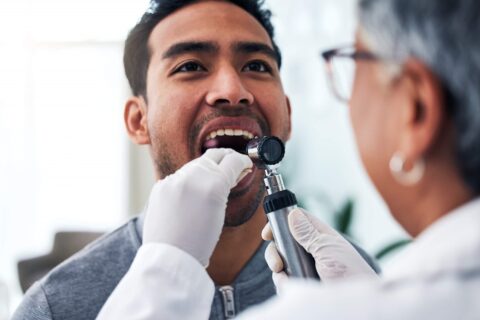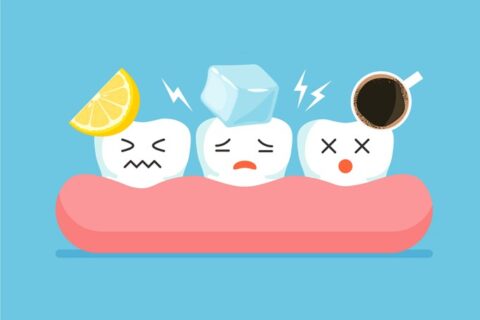How Pregnancy Affects Oral Health
Pregnancy changes your entire body’s focus to supporting a new life. That internal priority shift doesn’t stop at your new center of gravity or wild food cravings—it extends all the way to your smile. This means being pregnant calls for extra attention to your oral health. Here’s what to expect so you stay comfortable and healthy while protecting your baby’s development.
How Does Pregnancy Affect Oral Health?
Pregnancy sets off several internal changes, and your mouth feels the effects. Here are the most common ones to watch for:
- Hormone fluctuations: Higher estrogen and progesterone levels increase blood flow to the gums, which can cause swelling, tenderness, and bleeding. These same hormones also make the gums more sensitive to plaque and bacteria.
- Cravings and diet changes: You may crave sweet or acidic foods during pregnancy in response to your body’s need for quick energy or specific nutrients. Unfortunately, sweets and acids promote tooth decay.
- Morning sickness: Vomiting exposes your teeth to stomach acid, which erodes enamel. The effect is gradual but can cause real damage if not addressed.
- Non-food cravings: Some pregnant women develop cravings for ice or even non-edible items. Chewing these substances can crack or chip teeth and wear away enamel.
- Dry mouth or saliva changes: Pregnancy often decreases saliva production and affects its chemical makeup, reducing the ability to neutralize acid and wash away food particles.
- Heightened gag reflex: Brushing or flossing sometimes triggers nausea or gagging, making it tempting to skip these oral hygiene steps.
Dental Problems That May Occur During Pregnancy
The physical changes brought on by pregnancy increase your risk of certain dental issues that may impact you and your baby’s health. Talk to your dentist if you’re concerned about any of the following:
- Pregnancy gingivitis: This is a common condition where the gums become red and swollen and bleed easily. It can begin as early as the first trimester and intensify without treatment.
- Periodontal disease: If gum disease progresses during pregnancy, it may lead to periodontitis, which damages the soft tissue and bone that support the teeth. This advanced gum disease is linked with premature birth and low birth weight.
- Cavities: Eroded enamel, changes in diet, and a possible decline in oral hygiene make it easier for decay to form. Left untreated, cavities can lead to painful tooth infections.
- Pregnancy tumors: Some women develop benign overgrowths on the gums, often during the second trimester. Though harmless and usually temporary, they can cause discomfort or bleeding and may require removal if they interfere with eating or oral hygiene.
- Loose teeth: Ligaments and bones throughout the body, including those supporting the teeth, loosen during pregnancy. This can cause teeth to shift slightly or feel unstable.
Prenatal Dental Care Tips
A few simple changes to your routine help protect your oral health during pregnancy. Follow these tips to keep your teeth and gums strong:
- Brush with fluoride toothpaste twice daily: Fluoride helps remineralize enamel and prevent decay. Use a soft-bristled brush and take your time, especially if your gums are sensitive. If brushing triggers nausea, switch to a mint-free or mildly flavored toothpaste. An electric toothbrush may also help by shortening the time needed to clean effectively.
- Floss every day: Flossing removes plaque and food particles where brushes can’t reach. This is especially important when hormonal changes make gums more reactive to bacteria.
- Rinse after vomiting: Instead of brushing your teeth immediately, rinse with water and baking soda to neutralize acid. Brushing too soon after throwing up can damage the enamel more.
- Limit sugary or acidic snacks: Frequent snacking increases the number of acid attacks on your teeth. Choose calcium-rich foods like yogurt, cheese, and leafy greens to support your oral health and your baby’s bone development.
- Drink water regularly: Staying hydrated supports saliva production. If you can, drink fluoridated water to further protect your teeth.
- Visit your dentist at least once: A dental cleaning and checkup during pregnancy helps you catch problems early. Tell your dentist you’re pregnant and share any medications, supplements, or medical updates.
- Don’t postpone treatment: Some women avoid dental care during pregnancy, thinking it’s safer to wait, but untreated cavities or infections pose greater risks. Dental X-rays with proper shielding are perfectly safe during pregnancy, and any necessary treatment can be scheduled around your due date.
Dentistry for Expectant Mothers in Scottsdale
S&C Dental Scottsdale provides high-level dental care with personal attention that puts our patients at ease. Known for our gentle approach and deep understanding of patient concerns, we’ve helped many moms and moms-to-be feel confident and comfortable throughout this stage of life. To help support your healthiest smile during pregnancy, please schedule a visit at our Scottsdale office today.



